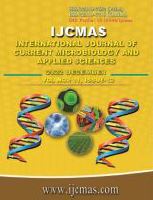


 National Academy of Agricultural Sciences (NAAS)
National Academy of Agricultural Sciences (NAAS)

|
PRINT ISSN : 2319-7692
Online ISSN : 2319-7706 Issues : 12 per year Publisher : Excellent Publishers Email : editorijcmas@gmail.com / submit@ijcmas.com Editor-in-chief: Dr.M.Prakash Index Copernicus ICV 2018: 95.39 NAAS RATING 2020: 5.38 |
Yeasts are the most important microorganisms during alcoholic fermentation because they influence fermentation speed, wine flavour and other wine qualities. The aim of this study was to Screen Yeasts Isolated from Agro-Material for Alcohol Fermentation Potential. Agro-materials used were palm wine and pineapple waste. The palm wine was left to ferment for five days. Both the fermented palm wine and the juice extracted were serially diluted in peptone water. From the diluted palm-wine and pineapple juice sample, 0.1ml of 10-5 and 10-6 dilutions were inoculated onto the PDA plates and spread-plated. The inoculated plates were incubated at 30°C for 48 – 72 hours, after which colonies were primarily identified by morphological and microscopic methods. Further identification was done using molecular techniques. TheIdentified isolates were screened for their tolerance ability. Yeast isolates were screened for Alcohol tolerance (0% to 15%), pH tolerance (pH 2 to pH 4) and sugar tolerance (0% to 20%). The results of the morphological characterization of the yeast showed that Isolates Pn3, Pw7 and Pw9 matched the description of Candida specie, isolate Pn4 identified as Pichia species, while isolates Pn5, Pw4, Pw5, Pw6 and Pw11 were identified as Saccharomyces cerevisiae. Results from molecular characterisation of the selected yeast isolates shows that Isolate PwP11 identifies as Saccharomyces cerevisiae strain YBA 08 which has NCBI accession number MN158119.1, PnY4 as Pichia kudriavzevii isolate A60G10 which has NCBI accession number MF285861.1 and PwP9 as Candida nivariensis strain CNRMA6.84 which has NCBI accession number KP131741.1. The yeast isolate for fermentation of ethanol screened revealed that Saccharomyces cerevisiae strain YBA 08 from 3 days old Palm wine and Pichia specie from 3days old Pineapple juice has the highest reading for pH tolerance, ethanol tolerance and sugar tolerance. These results reveal that both isolates had the ability to breakdown sugar containing substrate to alcohol and can tolerate pH environment.
 |
 |
 |
 |
 |